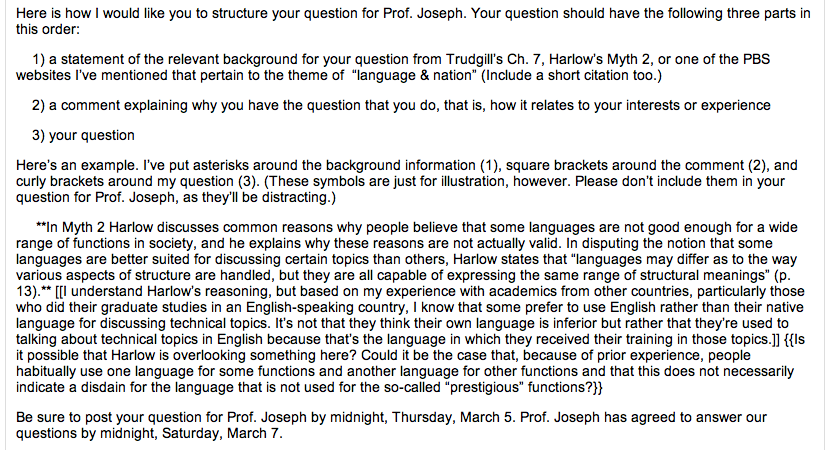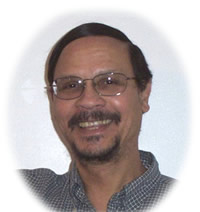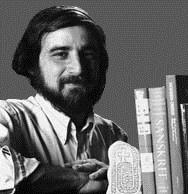Key Takeaways
- Asynchronous collaborative learning forums between students and experts can result in highly effective learning experiences beyond what the instructor can provide.
- Students must understand the course readings to frame thoughtful questions, but they also learn from their peers' questions and the experts' responses to all the questions in the forum, establishing a productive collaboration.
- Both students and experts found the exercise beneficial: the students principally appreciated the personal nature of the exchange, while the experts were impressed by the depth of the students' insights.
Teaching linguistics at a midsized public university in southeast Michigan, I have found asynchronous collaborative learning forums to be an effective learning activity for online courses — especially when teaching my graduate introductory class in sociolinguistics. As part of the course, I wanted to see whether and to what extent my students would benefit from entering into discussions with experts in the field asynchronously as part of their coursework.
In 2009, I created a learning activity in which students posed questions from an assigned reading and received responses from experts in asynchronous forums. In this article, I discuss the implementation of this activity for my online course during the winter term. I describe the structure of the forums and evaluate the learning outcomes for the students. Rather than using a synchronous chat for the activity, I chose instead to have students post their questions in asynchronous forums in our university's course management system, Moodle. I then forwarded the questions to the experts and posted their replies in the same asynchronous forums.
Why Not Synchronous Chats?
Although synchronous chats can be more dynamic, I found that students responded best to this learning activity through a series of asynchronous forums.
My decision not to use synchronous chats was based on several reasons:
- First, synchronous chats for online courses must be scheduled in advance by the university, which would have been tricky to coordinate with the experts.
- Second, some of the experts preferred the asynchronous format because it gave them more time to reflect on and respond to student questions.
- Third, I wanted to structure the activity so that every student had an opportunity to ask the expert a question. It would not have been possible to coordinate the lengthy and fully inclusive synchronous discussions with all the students and experts involved.
- Finally, I considered both parties' lack of familiarity with online learning technologies. I could not guarantee that the experts and students were all familiar with webconferencing applications such as Elluminate Live.
Goals for the Activity
I was motivated by four goals in creating this learning activity:
- My students enjoy writing about issues based on their own experience.1 They are less successful in linking their ideas with concepts from class readings. My first goal therefore was to give the students a chance to practice posing questions that were informed by their assigned readings. At the same time, I also wanted them to relate concepts from the readings to their own experience and interests, thereby making their questions personally meaningful.
- I endeavored to give the students a chance to explore the particular themes with experts who have more expertise than I do.
- I was interested in seeing other perspectives on language use from experts in disciplines other than linguistics.
- I wanted to give the students a chance to learn from each other's questions and the experts' responses. Beetham observed that although some learners prefer to learn alone (typically at advanced levels), beginners generally prefer dialogue with peer learners.2
Structure of the Online Forums
One expert hosted each of three online forums. The experts responsible for hosting the forums included: Brian Joseph and Don Winford of Ohio State University, both linguists, and Dikka Berven of Oakland University, a specialist in French language, literature, and culture.
The themes I selected dealt with general issues that my students encounter in their work as teachers:
- Forum 1 (Language and Nation), led by Professor Joseph, focused on language ideology and language planning in the United States and abroad.
- Forum 2 (Language and Ethnicity), headed by Professor Winford, dealt with questions pertaining to African-American Vernacular English (AAVE).
- Forum 3 (Language and Context), led by Dr. Berven, considered the sociolinguistics of address terms (e.g. Ms., Doctor, etc.) in English and French.
I have found that broad, general topics work best for this kind of forum because they are easiest for students to relate to their personal experience.
The forums were organized into three parts: first, the students read the relevant chapters in the course textbooks3 and posted a primary essay that tested their comprehension of the material. Next, following parameters I provided, they devised questions that I forwarded to the expert by e-mail. Once I received the expert's e-mail replies, I posted the questions and replies in an asynchronous online forum. Finally, the students provided reflections on the forum in a wrap-up essay.
Format for Student Questions
Student questions were written in the form of short essays and consisted of three parts. Figure 1 indicates the directions I gave the students for formulating their questions and provides a sample question in the required format.

Figure 1. Question Format and Sample Question
Not only did this question format enable the experts to see what issue students were referring to from the reading and whether they had an accurate understanding of it, but it gave them an idea of why the students posed particular questions. The format also encouraged students to formulate thoughtful questions by requiring them to discuss concepts from the readings.
Reflections on the Forums
The online forums inspired several realizations that I want to share with others interested in trying a similar exercise. In particular, I noticed that — knowingly or not — the students sometimes asked politically or socially sensitive questions, such as the question in Figure 2 addressed to Professor Joseph.

Figure 2. A Sensitive Question
Not surprisingly, I also found that students did not necessarily have an accurate understanding of the concepts they discussed. It was therefore important to see that the experts felt free to correct them. In Figure 3, for example, Professor Joseph clarified the meaning of phatic communication.

Figure 3. Misunderstanding Technical Concepts
The forums included situations where the views expressed in the readings conflicted with those of the forum expert, as was the case in the forum on AAVE. Professor Winford, for instance, explained why he did not concur with textbook author Trudgill's assessment of AAVE as a creole language (Figure 4).

Figure 4. Opposing Views
Finally, I was concerned with the repetitive nature of some questions. Reasons for this may include limitations in the nature of the subject matter or student copying.
Recommendations
From these observations, I offer the following three recommendations:
- Experts must be prepared to answer even difficult questions, including those that in other academic contexts would require a more complex answer (such as those noted in Figures 2 and 4).
- Instructors should anticipate the possibility of different viewpoints before holding each forum and should prepare students to expect differences of opinion between the expert and the author of the reading.
- It might be advisable to have students submit questions privately, to be revealed only when the expert has replied to everyone in the online forum. Similarly, the experts might consider providing a group response to similar questions.
Assessment and Effectiveness of the Forums
To assess the effectiveness of these student-expert forums, I compared student performance to the goals established at the beginning.
Goal 1: Pose Informed Questions
Not having taught this online course before 2009, I could not compare students' grades for this activity with those of prior classes that did not participate in the expert forums learning activity. Nonetheless, I used student grades for the online forums as a way to assess whether students posed questions successfully, in the required format, believing that high grades would indicate that students had effectively practiced forming thoughtful questions and learned from the experts' answers. Only 2 of the 15 students in the course did not earn high grades.4 While acknowledging the limitations of this study approach, I have tentatively concluded that the three-part question format — mediated by experts — was an effective learning experience.
The three-part question write-ups can be compared with the peer replies students wrote in response to each other's module essays, which also required them to pose questions with references to the class readings. I found that students did not link their questions to the readings of their own accord (i.e., they did not already know how to do this) and needed to practice doing so. The forums with experts gave the students an additional opportunity to master linking their ideas to the class readings.
Pre- and post-testing to determine learning outcomes would have offered more methodological rigor to the exercise, but even without that I believe that the forums were effective. Indeed, it is clear that many of the students gained meaningful personal significance or insight from the experience.
One student, for instance, commented that she gained a better appreciation of avoidance by linking it with her own experience. (Avoidance is a speaker's omission of an address term toward a participant in conversation because the speaker is not sure which term is appropriate.)
"Until I read Trudgill, I had not given a lot of thought to address terms and was unaware of avoidance. And then I experienced this personal connection that resonated with me as I realized that I now had the language and knowledge to explain why I have never really addressed my in-laws with any address terms for the last twenty years!"
When the student found a personally meaningful example to illustrate the concept, she became interested in learning more about it. Other students may have had similar reactions.
Goal 2: Drawing on Expertise Within the Linguistics Community
The invited experts provided more comprehensive answers than the instructor alone could have offered. For example, Professor Joseph answered questions about Albanian, Greek, Latin, and other languages, while Professor Winford discussed AAVE, the term Ebonics, pidgins and creoles, and other topics. Dr. Berven focused on questions dealing with avoidance, government efforts to "purify" the French language, teaching French, etc.
Goal 3: Invite an Expert from a Related Discipline
The forum on address terms employed an interdisciplinary approach that worked well. Dr. Berven highlighted the role of culture in her discussion of the forum theme rather than focusing primarily on language structure — as might have been expected from a linguist. Her approach is illustrated in Figure 5.

Figure 5. Highlighting the Role of Culture
Goal 4: Learn from Classmates and Experts
Each forum came to encompass such a wide range of questions that students were able to gain a comprehensive overview of the forum theme from reading their peers' questions and the experts' replies. One student commented, "What I particularly enjoyed most was reading the experts' responses to the interesting questions my fellow classmates posed."
Student and Expert Evaluations of the Forums
Overall, the three online forums were rewarding for both students and the experts.
Some of the students' comments from the wrap-up essays in the modules indicate as much:
"The response I received from Prof. Joseph was invaluable. My question had to do with educational policies that teach students in their native language first."
"I posed the question to Prof. Winford about how educators should handle teaching students who use AAVE ... I completely respect his answer, and it's helped to clarify my role as an educator."
"I enjoyed the thoughtful responses that Dr. Berven wrote to all of us. Her advice for teaching technical vocabulary was perfect."
The three experts also appraised their experience and evaluated the forums.
Professor Brian Joseph, Department of Linguistics, Ohio State University, Columbus, Ohio, explains his reactions to answering forum questions:
Professor Don Winford, Department of Linguistics, Ohio State University, Columbus, Ohio, noted:

Don Winford
"I found the experience quite enjoyable, and also challenging, since students asked some very complex questions about the origins of African American English and its relationship to other dialects of English and English-lexicon creoles. The questions in fact suggested very great insight as well as critical thinking on the part of the students, and it was a pleasure to answer them."
Dr. Dikka Berven, Department of Modern Languages and Literatures, Oakland University, Rochester, Michigan, talks about the value of experts, specifics of French language expertise, and the expert forum experience:

Dikka Berven
Concluding Thoughts
Despite the informal nature of this study, I suggest that asynchronous online forums with experts are a useful addition to online courses because they encourage students to engage more meaningfully with themes addressed in the course. The explanations, examples, anecdotes, and corrections offered by the experts are invaluable to students because they are tailored to their specific questions and interests. Finally, the asynchronous format is optimal because it allows all parties involved the time necessary to form thoughtful questions and responses.
- Most of my students are K–12 teachers working toward an ESL endorsement.
- Helen Beetham, "An Approach to Learning Activity Design," in Helen Beetham and Rhonda Sharpe (eds.), Rethinking Pedagogy for a Digital Age: Designing and Delivering E-learning (London: Routledge, 2007), pp. 26-40.
- Peter Trudgill, Sociolinguistics: An Introduction to Language and Society (London: Penguin, 2000); and Laurie Bauer and Peter Trudgill, Language Myths (London: Penguin, 1998).
- One student received a zero for two forums due to a failure to submit a question by the deadline; another received a low grade for one forum due to a failure to understand the reading.
© 2011 Helena Riha. The text of this EQ article is licensed under the Creative Commons Attribution-Noncommercial-No Derivative Works 3.0 license.


